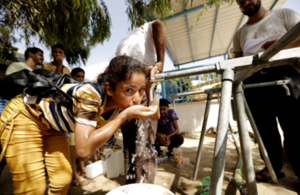DFID steps up support for emergency health and sanitation in Gaza
£3 million in funding has been awarded to 10 non-governmental organisations (NGOs) to help more than half a million people in Gaza.

Clean water and sanitation is critical to prevent disease breaking out. Picture: Iyad Al Baba/Oxfam
Ten charities are to work with the UK Department for International Development to provide emergency medical supplies, clean water and sanitation for more than half a million people in Gaza, International Development Secretary Justine Greening announced today.
The UK’s Rapid Response Facility was activated on Saturday 2 August, with a call put out for charities to come forward with proposals on providing key humanitarian assistance. Since then all applications have been assessed and £3 million in UK funding has been awarded to the NGOs best placed to meet urgent needs in Gaza.
The announcement follows UN warnings that medical services in Gaza are on the verge of collapse and the risk of disease epidemics continues to increase as a growing number of people are crammed into temporary shelters.
Justine Greening said:
This extra support will enable trusted partners who are already working with communities on the ground in Gaza to be able to meet emergency medical needs, provide clean water for people and reduce the risk of disease.
We have got to do everything we can to help prevent any epidemics breaking out, which is a growing risk given the cramped, dirty conditions that hundreds of thousands of displaced Gazans now find themselves living in.
The situation in Gaza is critical. The Rapid Response Facility means we can act quickly to get aid to people who need it, but above all we need a lasting and durable ceasefire which is respected by all sides. That is the only way to prevent more loss of life.
The £3 million will be divided between NGOs including International Medical Corps, Care International and International Health Partners. It will help to:
- provide more than 550,000 of the most vulnerable people with clean water and sanitation by repairing water pumps and distributing water treatment products;
- distribute hygiene kits and promote disease prevention programmes;
- ensure that more than 480,000 people receive immediate healthcare and can see GPs, and that hospitals receive essential drugs and emergency medicine kits;
- meet basic health needs for 900 vulnerable people with disabilities, including rehabilitation for people who may have lost limbs or been injured in the fighting;
- provide more than 8,400 older people, particularly vulnerable older women and widows, with healthcare and access to clean water and sanitation; and
- support local radio stations and SMS/mobile channels that are providing life-saving humanitarian and health information to up to 95% of the Gazan population, a highly effective approach most recently used in the Philippines as part of the UK’s response to Typhoon Haiyan.
The £3 million will be divided between a total of 10 pre-approved partners including Handicap International, Action Against Hunger, Care International, International Health Partners (IHP), Plan, Oxfam, HelpAge International, International Medical Corps, Norwegian Refugee Council and Internews.
Notes to editors
-
The Rapid Response Facility (RRF) was established in March 2012. It is a network of pre-approved specialist aid organisations and private businesses who can rapidly deliver emergency medical, water and sanitation assistance to affected people.
-
The UK has now made a total of £15 million available since the start of this current crisis. This includes:
- a total of £6 million for the UNRWA’s Flash Appeal to pay for basics such as shelter and cooking equipment
- £3 million to the World Food Programme to provide emergency food for more than 300,000 people for one month
- £3 million for the International Committee of the Red Cross (ICRC) to provide emergency healthcare and clean water and
- £3 million, which has been made available for clean water, emergency healthcare and protection of civilians through the Rapid Response Facility, which was activated on Saturday 2 August.
General media queries (24 hours)
Email mediateam@dfid.gov.uk
Telephone 020 7023 0600
If you have an urgent media query, please email the DFID Media Team on mediateam@dfid.gov.uk in the first instance and we will respond as soon as possible.